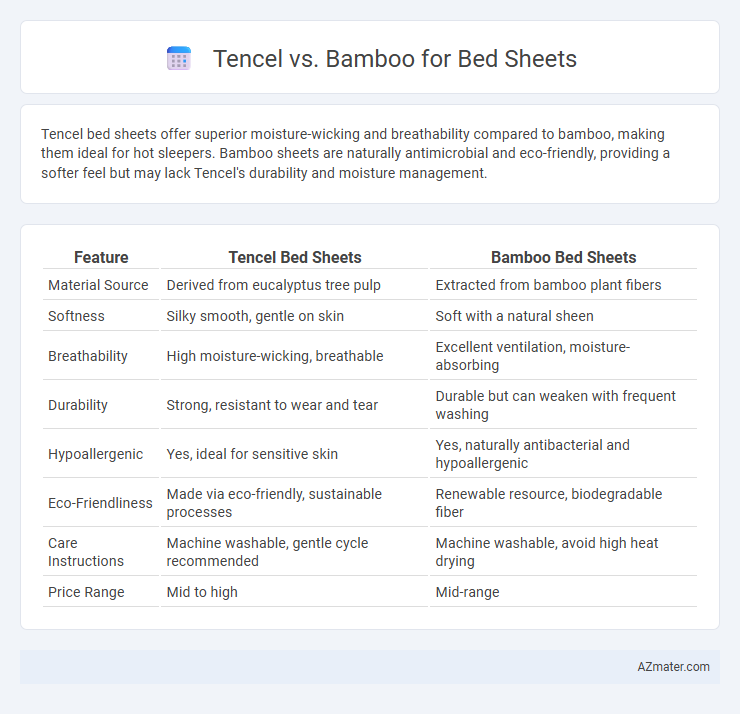Tencel bed sheets offer superior moisture-wicking and breathability compared to bamboo, making them ideal for hot sleepers. Bamboo sheets are naturally antimicrobial and eco-friendly, providing a softer feel but may lack Tencel's durability and moisture management.
Table of Comparison
| Feature | Tencel Bed Sheets | Bamboo Bed Sheets |
|---|---|---|
| Material Source | Derived from eucalyptus tree pulp | Extracted from bamboo plant fibers |
| Softness | Silky smooth, gentle on skin | Soft with a natural sheen |
| Breathability | High moisture-wicking, breathable | Excellent ventilation, moisture-absorbing |
| Durability | Strong, resistant to wear and tear | Durable but can weaken with frequent washing |
| Hypoallergenic | Yes, ideal for sensitive skin | Yes, naturally antibacterial and hypoallergenic |
| Eco-Friendliness | Made via eco-friendly, sustainable processes | Renewable resource, biodegradable fiber |
| Care Instructions | Machine washable, gentle cycle recommended | Machine washable, avoid high heat drying |
| Price Range | Mid to high | Mid-range |
Introduction: Tencel vs Bamboo Bed Sheets
Tencel bed sheets, made from sustainably sourced eucalyptus fibers, offer exceptional moisture-wicking properties and a silky-smooth texture, ideal for sensitive skin. Bamboo bed sheets, derived from bamboo pulp, provide natural antimicrobial benefits and a breathable, cooling feel perfect for hot sleepers. Both fabrics emphasize eco-friendly production but differ in fiber processing and texture, influencing comfort and durability.
Material Origins and Sustainability
Tencel bed sheets are made from sustainably sourced eucalyptus trees through a closed-loop process that recycles water and solvents, minimizing environmental impact. Bamboo bed sheets originate from fast-growing bamboo plants, which require no pesticides and regenerate quickly, contributing to their eco-friendliness. Both materials offer biodegradable and renewable options, but Tencel's production method emphasizes resource efficiency and reduced chemical use, positioning it as a highly sustainable choice.
Softness and Feel Comparison
Tencel bed sheets are renowned for their exceptionally smooth, silky texture and boast superior moisture-wicking properties, making them ideal for a cool, breathable sleep experience. Bamboo sheets also offer a soft, plush feel but tend to be slightly thicker and heavier, providing a cozy warmth that some sleepers prefer. Both materials rank highly in softness, yet Tencel's finer fibers create a more luxurious, drapey feel compared to bamboo's natural resilience and durability.
Breathability and Temperature Regulation
Tencel bed sheets exhibit superior breathability due to their microfibers, which efficiently wick moisture and promote airflow, making them ideal for hot sleepers. Bamboo sheets also offer excellent temperature regulation, naturally possessing antimicrobial properties and moisture-wicking abilities that keep the body cool and dry. Both materials outperform traditional cotton in maintaining optimal sleep temperature, but Tencel's eco-friendly production and softness enhance comfort and breathability.
Moisture-Wicking Abilities
Tencel bed sheets excel in moisture-wicking due to their eucalyptus-based fibers that efficiently absorb and release moisture, keeping sleepers dry and comfortable throughout the night. Bamboo sheets also offer strong moisture-wicking properties attributed to their natural hollow fiber structure, which enhances breathability and quick drying. Both materials outperform traditional cotton in moisture management, but Tencel's sustainable production process and superior temperature regulation make it a preferred choice for those seeking optimal moisture control.
Durability and Longevity
Tencel bed sheets are known for their exceptional durability due to their strong fiber structure derived from sustainably sourced eucalyptus wood, which resists wrinkles and maintains softness after multiple washes. Bamboo sheets, while naturally antibacterial and moisture-wicking, tend to be less durable as their fibers can weaken faster over time, especially with frequent laundering. Opting for Tencel offers longer-lasting bed linens with consistent performance in durability and lifespan compared to bamboo alternatives.
Hypoallergenic and Skin Friendliness
Tencel bed sheets, made from sustainably sourced eucalyptus fibers, offer superior hypoallergenic properties by naturally resisting dust mites and bacteria, making them ideal for sensitive skin. Bamboo sheets, crafted from bamboo pulp, also provide excellent moisture-wicking and antimicrobial benefits that reduce irritation and promote skin health. Both materials are breathable and gentle, but Tencel's smooth fiber structure often results in enhanced softness and reduced allergic reactions.
Eco-Friendliness and Environmental Impact
Tencel bed sheets are made from sustainably sourced eucalyptus trees using a closed-loop production process that recycles water and solvents, minimizing environmental impact. Bamboo sheets, while naturally biodegradable and requiring less water than cotton, often involve chemical-heavy processing that can harm ecosystems. Choosing Tencel over bamboo for bed sheets generally offers a more eco-friendly option due to its lower water usage and reduced chemical treatments.
Care Instructions and Maintenance
Tencel bed sheets require gentle machine washing in cold water with mild detergent and should be air-dried or tumble dried on low heat to maintain fabric softness and durability. Bamboo sheets also benefit from cold or warm water washing with non-bleach detergents, avoiding high heat drying to prevent shrinkage and preserve moisture-wicking properties. Both fabrics demand minimal ironing, and avoiding fabric softeners helps retain their natural breathability and hypoallergenic qualities.
Price and Value for Money
Tencel bed sheets typically cost more than bamboo sheets due to their eco-friendly lyocell fibers and advanced production process, offering superior moisture-wicking and durability. Bamboo sheets are generally more affordable and provide a soft, silky feel but may lack the long-term resilience and breathability of Tencel. When considering value for money, Tencel sheets deliver better performance and longevity, justifying the higher price point for those seeking sustainable comfort.

Infographic: Tencel vs Bamboo for Bed Sheet
 azmater.com
azmater.com